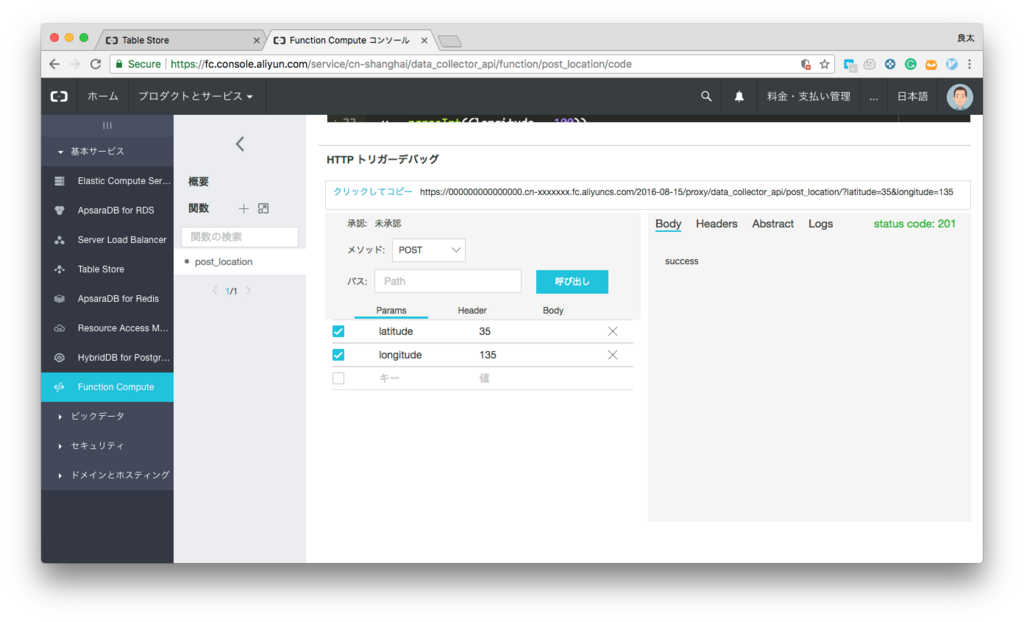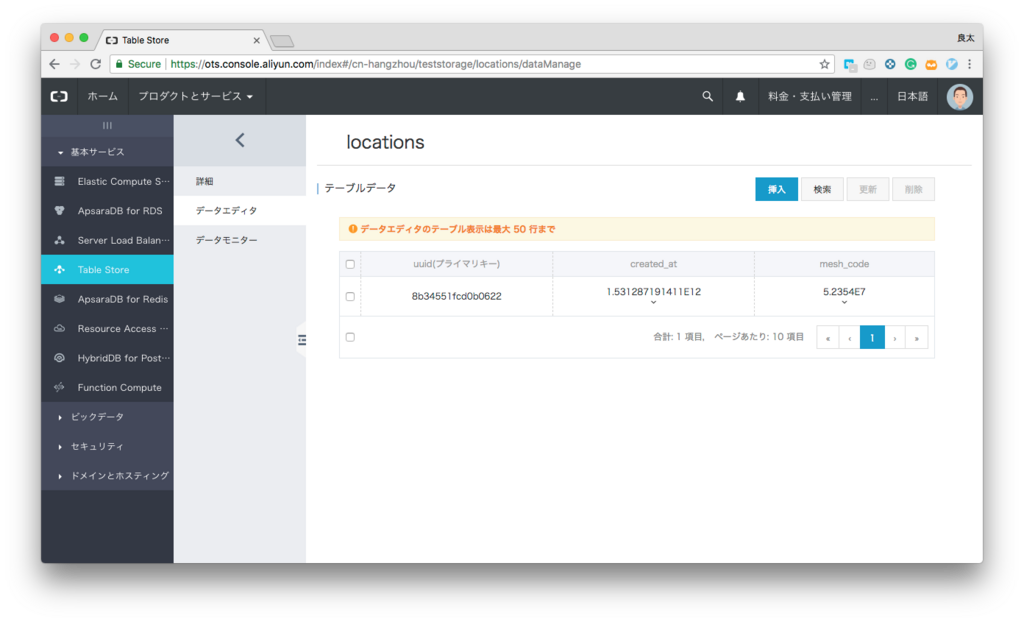FunctionComputeとTableStoreを連携します。
作るもの
 スマートフォンから送信された位置情報をTableStoreに保存する
スマートフォンから送信された位置情報をTableStoreに保存するPOST: /locationsというエンドポイントをFunctionComputeで作ります。
エンドポイントはswaggerだとこんな感じになります。
/locations: post: summary: "Create a new Location" consumes: - "application/json" produces: - "application/json" parameters: - in: "body" name: "location" description: "Location object" required: true schema: properties: latitude: type: "integer" longitude: type: "integer" responses: 201: description: "created" # 40xなど他のレスポンスはputRow()のエラーから取得します。
ちなみに、実際にTableStoreに保存するのは地域メッシュデータと呼ばれる、緯度経度から算出した1km四方のメッシュ番号です。緯度経度から簡単に計算できます。
準備
TableStoreにuuid: STRINGをプライマリキーとしたlocationsテーブルを作っておきます。
コンソールからポチポチするかコードから作るかしましょう。
コードから作成する場合は以下の記事が参考になります。 asmsuechan.hatenablog.com
実装
HTTPトリガーでTableStoreを叩くコードをnodejsで書いてこれをFunction Computeに乗せます。
Function ComputeとTableStoreそれぞれに関しては以下の記事が参考になると思います。 qiita.com
さてコードです。最初は送られてきた緯度経度をそのままTableStoreに保存します。
// post_location.js const TableStore = require('tablestore') const getRawBody = require('raw-body') const crypto = require('crypto') const Long = TableStore.Long; const instanceName = 'teststorage' const tableName = 'locations' module.exports.handler = function(request, response, context) { getRawBody(request, (err, data) => { const uuid = crypto.randomBytes(8).toString('hex') const params = { tableName: tableName, condition: new TableStore.Condition(TableStore.RowExistenceExpectation.IGNORE, null), primaryKey: [{ 'uuid': uuid }], attributeColumns: [ { 'latitude': request.queries.latitude }, { 'longitude': request.queries.longitude }, { 'created_at': Date.now() } ], returnContent: { returnType: TableStore.ReturnType.Primarykey } } const client = new TableStore.Client({ accessKeyId: ’LTAxxxxxxxxxxxx’, secretAccessKey: ’Rztxxxxxxxxxxxxxxxxxxxx’, endpoint: `https://${instanceName}.cn-xxxxxx.ots.aliyuncs.com`, instancename: instanceName, }) let status = 500 let body = '' client.putRow(params, (err, data) => { if (err) { status = err.code body = err.message console.log('error:', err) } else { status = 201 body = 'success' console.log('success:', data) } const respBody = new Buffer(body) response.setStatusCode(status) response.setHeader('content-type', 'application/json') response.send(respBody) }) }) }
次にfcliから新しくサービス、関数、トリガーを作成します。
fcliがない方はGItHub Releasesから最新版をダウンロードしてください。
Releases · aliyun/fcli · GitHub
$ fcli shell >>> mks data_collector_api >>> ls data_collector_api >>> cd data_collector_api >>> mkf post_location -h post_location.handler -t nodejs6 >>> ls post_location >>> cd post_location >>> mkt post_handler -t nodejs6 -c httpTrigger.yml
httpTriggerはこんな感じにしています。ちなみにトリガーの設定ファイルはトリガー種別により違います。
# httpTrigger.yml triggerConfig: authType: anonymous methods: ["POST"]
参考: トリガーとイベントの設定 - ユーザーガイド| Alibaba Cloud ドキュメントセンター
地域メッシュデータを保存するようにする
地域メッシュコードを計算する関数を作ってこっちを代入するように変更します。
function calc_mesh_code (latitude, longitude) { p = parseInt((latitude * 60 / 40)) a = (latitude * 60) % 40 q = parseInt((a / 5)) b = a % 5 r = parseInt((b * 60 / 30)) c = (b * 60) % 30 u = parseInt((longitude - 100)) f = longitude - (u + 100) v = parseInt((f * 60 / 7.5)) g = (f * 60) % 7.5 w = parseInt((g * 60 / 45)) h = (g * 60) % 45 return parseInt(`${p}${u}${q}${v}${r}${w}`) }
変更できたらupfで関数をアップデートします。
>>> upf -d code -h post_location.handler -t nodejs6
画面からサクッとテストします。latitudeとlongitudeというパラメーターを作って値を入れ、「呼び出し」を押します。

TableStoreのコンソール画面からlocationsテーブルを見てみると、ちゃんと地域メッシュコードが計算されてストアされています。

まとめ
規模が小さいAPIを作る時、HerokuなどのPaaSを使うかこんな感じでサーバレスとして実装するか少し悩みますね。